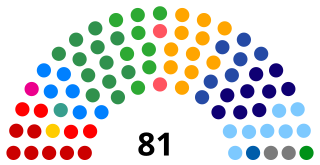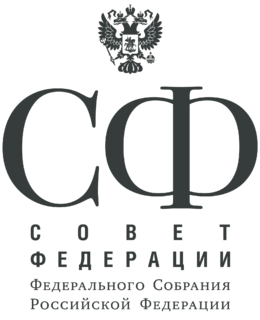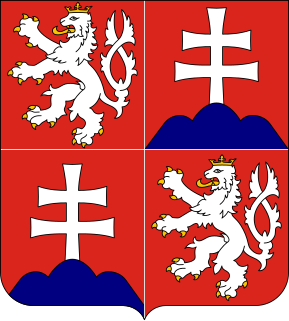
The Sejm, officially known as the Sejm of the Republic of Poland, is the lower house of the bicameral parliament of Poland.

The Supreme Soviet of the Union of Soviet Socialist Republics was, beginning in 1936, the most authoritative legislative body of the Union of Soviet Socialist Republics (USSR), and the only one with the power to approve constitutional amendments. Prior to 1936, the Congress of Soviets was the supreme legislative body. During 1989–1991 a similar, but not identical structure was the supreme legislative body. The Supreme Soviet elected the USSR's collective head of state, the Presidium; and appointed the Council of Ministers, the Supreme Court, and the Procurator General of the USSR.
A member of parliament (MP) is the representative in parliament of the people who live in their electoral district. In many countries with bicameral parliaments, this term refers only to members of the lower house since upper house members often have a different title. The terms congressman/congresswoman or deputy are equivalent terms used in other jurisdictions. The term parliamentarian is also sometimes used for members of parliament, but this may also be used to refer to unelected government officials with specific roles in a parliament and other expert advisers on parliamentary procedure such as the Senate Parliamentarian in the United States. The term is also used to the characteristic of performing the duties of a member of a legislature, for example: "The two party leaders often disagreed on issues, but both were excellent parliamentarians and cooperated to get many good things done."

The speaker of a deliberative assembly, especially a legislative body, is its presiding officer, or the chair. The title was first used in 1377 in England.

The Chamber of Deputies is the lower house of the Congress of the Union, the bicameral parliament of Mexico. The other chamber is the Senate. The structure and responsibilities of both chambers of Congress are defined in Articles 50 to 70 of the constitution.
The government of Czechoslovakia under Marxism–Leninism was in theory a dictatorship of the proletariat. In practice, it was a one-party dictatorship run by the Communist Party of Czechoslovakia, the KSC.

The National Assembly is the legislature for Venezuela that was first elected in 2000. It is a unicameral body made up of a variable number of members, who were elected by a "universal, direct, personal, and secret" vote partly by direct election in state-based voting districts, and partly on a state-based party-list proportional representation system. The number of seats is constant, each state and the Capital district elected three representatives plus the result of dividing the state population by 1.1% of the total population of the country. Three seats are reserved for representatives of Venezuela's indigenous peoples and elected separately by all citizens, not just those with indigenous backgrounds. For the 2010 to 2015 the number of seats was 165. All deputies serve five-year terms. The National Assembly meets in the Federal Legislative Palace in Venezuela's capital, Caracas.

The National Congress of Brazil is the legislative body of Brazil's federal government. Unlike the state legislative assemblies and municipal chambers, the Congress is bicameral, composed of the Federal Senate and the Chamber of Deputies. The Congress meets annually in Brasília from 2 February to 22 December, with a mid-term break taking place between 17 July and 1 August.

The Federation Council, or Senate, is the upper house of the Federal Assembly of Russia, according to the 1993 Constitution of the Russian Federation. Each of the 85 federal subjects of Russia – consisting of 22 republics, 46 oblasts, nine krais, three federal cities, four autonomous okrugs, and one autonomous oblast – sends two senators to the Council, for a total membership of 170 Senators. In addition, the Constitution also provides for senators from the Russian Federation, which can be no more than thirty, as well as (optionally) former presidents as life senators.

The Connecticut State Senate is the upper house of the Connecticut General Assembly, the state legislature of the U.S. state of Connecticut. The state senate comprises 36 members, each representing a district with around 99,280 inhabitants. Senators are elected to two-year terms without term limits. The Connecticut State Senate is one of 14 state legislative upper houses whose members serve two-year terms; four-year terms are more common.

The Plurinational Legislative Assembly is the national legislature of Bolivia, placed in La Paz, the country's seat of government.

The Chamber of Deputies is a federal legislative body and the lower house of the National Congress of Brazil. The chamber comprises 513 deputies, who are elected by proportional representation to serve four-year terms. The current President of the Chamber is the Deputy Arthur Lira (PP-AL), who was elected on 1 February 2021.
A member of the Legislative Assembly (MLA) is a representative elected by the voters of a constituency to a legislative assembly. Most often, the term refers to a subnational assembly such as that of a state, province, or territory of a country. Still, in a few instances, it refers to a national legislature.

The Federal Assembly was the federal parliament of Czechoslovakia from January 1, 1969 to the dissolution of Czechoslovakia on December 31, 1992. It was Czechoslovakia's highest legislative institution.

The Federal Parliamentary Assembly is Ethiopia's federal legislature. It consists of two chambers:

The Nevada Assembly is the lower house of the Nevada Legislature, the state legislature of the U.S. state of Nevada, the upper house being the Nevada Senate. The body consists of 42 members, elected to two-year terms from single-member districts. Each district contained approximately 64,299 people as of the 2010 United States Census. Term limits, limiting assembly members to six 2-year terms, took effect in 2010. Twelve members of the Nevada Assembly were termed out with the 2010 election serving their last legislative session in 2011.

The Government of Malaysia, officially the Federal Government of Malaysia, is based in the Federal Territory of Putrajaya with the exception of the legislative branch, which is located in Kuala Lumpur. Malaysia is a federation of 11 states of Peninsular Malaysia, Sabah, Sarawak and 3 Federal Territories operating within a constitutional monarchy under the Westminster system and is categorised as a representative democracy. The federal government of Malaysia adheres to and is created by the Federal Constitution of Malaysia, the supreme law of the land.

The Sabah State Legislative Assembly is a part of the legislature of Sabah, Malaysia, the other being the governor of Sabah. The assembly meets at the Sabah State Legislative Assembly Building at Likas in the state capital of Kota Kinabalu.

The Sarawak State Legislative Assembly is the legislative chamber of the unicameral legislature of the Malaysian state of Sarawak; the Yang di-Pertua Negeri of Sarawak forms the other part of the legislature. The Assembly is modelled after the traditions of the Westminster parliamentary system, which originates from the practices of the British Parliament. The executive branch of government is drawn from the elected members of the Assembly. The State Legislative Assembly sits at the Sarawak State Legislative Assembly Building located in Petra Jaya in Kuching, the state capital.

The Chairman of the Federation Council of the Federal Assembly of the Russian Federation, also called Speaker (спикер), is the presiding officer of the Upper house of the Russian parliament. It is the third highest position, after the President and the Prime Minister, in the government of Russia. In the case of incapacity of the President and Prime Minister, the chairman of the Federation Council becomes Acting President of Russia.

















